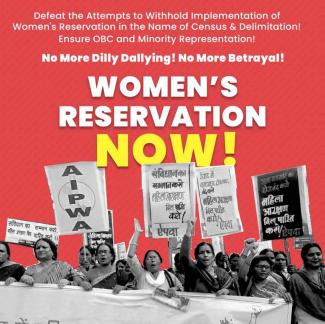Since coming to power, the BJP has kept two promises. Firstly, it has handsomely paid back to the corporates that paved its way to power. Whether it is neo-liberal policy prescriptions under various garbs including Make in India, Start-up India, Skill India, Digital India, National Monetisation Pipeline, Demonetisation, etc. or changes in the law (for instance the Labour Codes and the 2023 amendment to Forest Conservation Act), these are corporate pocket-filling exercises while creating a deepening economic crisis, highest-ever unemployment, depreciating wages, and unprecedented economic and social inequality. Besides corporate appeasement, the other promise kept by the BJP is encoding the Sangh Parivar’s Hindutva ideology into law (Article 370, Hijab ban), and communal hatred and polarisation into society. Outside of that, there have been a long list of lies and pipe-dreams. Creating 2 crore jobs annually, doubling of farmers’ income, $ 5 trillion economy, house for every Indian by 2022, among others have all turned out to be jumlas much like the promise to return black money to Indian shores and and deposit Rs. 15 lakh from it to every citizen's bank account.
The false promise of women’s reservation
The Women’s reservation now joins this long list of illusionary promises to attempt to hoodwink the people before the assembly elections of 2024. But of course the media and the BJP IT cell has manufactured a propaganda to fool people about the reality of this new promise.
In the Special Session of Parliament earlier in September, the Modi government tabled the Constitution (128th Amendment) Bill, 2023 which proposes to reserve, for women, 33% of the seats in Lok Sabha, state legislatures, and the Delhi legislative assembly for women. So far so good. However, this amendment is to come into effect “after an exercise of delimitation is undertaken for this purpose after the relevant figures for the first census taken after commencement of the Constitution (One Hundred and Twenty-eight Amendment) Act, 2023 have been published”. Here lies the catch.
In simple words, there will be no women’s reservation in any of the upcoming state assembly elections or in the 2024 general elections since this amendment will not come into effect immediately. It is a pipe dream, contingent on the fulfilment of two uncertain, and politically volatile, conditions. Firstly, there has to be a decennial Census. Secondly, the exercise of delimitation has to be completed pursuant to this Census. Only if, and when, these two are done, will the women’s reservation be provided.
Let us remember that the last decennial Census was held in 2011, and the scheduled Census of 2021 has been repeatedly postponed by the Modi government, under one pretext or the other. Initially the Modi government claimed that the Census could not be done because of Covid, but now it is apparent that the BJP government does not want to conduct the Census since it includes collection of crucial data and indicators that would belie their development claims. In any instance, any possibility of the next decennial Census is much after the 2024 General Elections.
The second contingency is the delimitation exercise being carried across India subsequent to the decennial Census. Delimitation basically entails the allocation of Lok Sabha seats and re-drawing of Lok Sabha constituencies on the basis of the Census results. It is necessary to note here that Article 82 of the Constitution virtually bars the delimitation exercise prior to the first census figures post 2026. Moreover, the next delimitation process is going to potentially be most controversial. Southern States have already raised their apprehensions of losing what little political clout is left in the arena of national politics since their success in controlling the population as compared to the norther states could mean lesser proportional representation in parliament. Given this context, the delimitation exercise will be time-consuming, even more than the previous delimitation exercise which took about 5 years. From this, it can be estimated that the earliest elections when women’s reservation could be implemented is 2039!
Such is the travesty! Bear in mind that the BJP did not bring women’s reservation for the past 9 ½ years it has been in power. During this time, the BJP has enjoyed brute majority in parliament, which it has deployed to ram through communal amendments to the Constitution (Abrogation of Article 370, for instance) and pro-corporate legislations (recent amendments to the Forest Conservation Act, for instance). As such, passing an amendment mandating immediate women’s reservation should not have been a problem. In fact, it may have been easier since opposition parties would not stand in the way of this proposal. Instead the Modi government has produced a constitutional jumla in the form of the Constitution (128th Amendment) Bill, 2023. One recalls here the words of Gandhi, when faced with the promise of dominion status after the war by the Cripps Mission, that such an offer was a “post-dated cheque drawn on a bank that failed”, since it was apparent that the sole purpose of the Cripps Mission was to secure cooperation in the war efforts.
Delayed and inadequate
The injustice does not end there. The amendment by the BJP government, besides the unwarranted conscious deferment of women’s reservation, falls short of two other counts. In the first instance, there is no concern for adequate representation of all sections of women, especially the underrepresented Muslim and OBC community and other deprived sections, and secondly, there is no logic in keeping the Rajya Sabha and Legislative Councils in states with bicameral legislature outside of the ambit of the women's reservation.
In a sense, BJP’s deception is also realised when comparing this amendment to the previous legislative effort at women’s reservations, particularly during UPA-II. Women’s reservation was then proposed vide the Constitution (One Hundred and Eighth Amendment) Bill, 2008, that was passed by the Rajya Sabha but lapsed after the dissolution of the 15th Lok Sabha (2009-14). In this version, there is no conditional implementation of women’s reservation. It was to be implemented immediately after it was passed in Parliament. This is the one crucial difference between that Bill and the present proposed amendment where its implementation is conditional.
Eyewashing of history
Two points in Modi’s speech cannot be allowed to pass unremarked. He specifically stated that the discussion on Women's Reservation Bill has happened for a long time and even during Atal Bihari Vajpayee's regime a Bill was introduced but this could not go through due to lack of majority.
In the first instance Vajpayee’s was not the first effort to address the gender inequality in elected houses. The first step perhaps was the 73rd and 74th Constitutional Amendments in 1992, which provided reservation for women in Panchayats and Municipalities. It was when Deve Gowda was the Prime Minister that, in 1996, a Bill was introduced to reserve for women, 33% of the seats filled by direct election in the Lok Sabha and Legislative Assemblies of the States for women. This Bill lapsed without being passed. Then came the December 1998 Bill in the 12th Lok Sabha, when Vajpayee was the Prime Minister which lapsed. Immediately another Bill was introduced in December 1999, again with Vajpayee at the helm, which again failed due to lack of consensus amongst political parties. Second aspect that Modi stressed on, was the lack of majority for Vajpayee to push through women’s reservation. Clearly the BJP doesn’t suffer from that disability and it has rammed through its pet constitutional amendments and legislations in the 9 years it has been in power. Now, having suffered a drubbing at the hands of the people of Karnataka, diminishing prospects in the upcoming assembly elections in Telangana, Madhya Pradesh, Chhattisgarh, Rajasthan and Mizoram, and facing a united opposition in INDIA, the BJP has resorted to a cheap gimmick to hoodwink the people.
Conclusion
The protection and advancement of rights of women has to be the core agenda of the any government, and history stands proof to the tough battles that have realised these rights. Regardless of what the BJP propaganda machine spews, the fact is that the Modi government has constitutionally halted the immediate implementation of women’s reservation.
Lost in the din of this propaganda is the fact that President Droupadi Murmu, the first Adivasi woman President of the country, was denied an invitation to this so-called 'historic moment of women's empowerment', to which the BJP opted to incite elite dominant caste Bollywood actress. The hypocrisy of the Modi government’s claim of woman empowerment is also exposed by the premature release of the Bilkis Bano case convicts, who committed horrific crimes of gang rape of Muslim women and their murder as also of their children, and its silence at the atrocities heaped on women in Manipur.
Women's reservation to ensure political representation and rectify the acute under-representation of women in the legislature, has been a long-standing demand, within the larger struggle for gender equality and ending patriarchy. Faced with this shocking betrayal, there is no choice but to heighten this struggle and demand for immediate implementation of women’s reservation.








